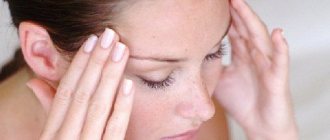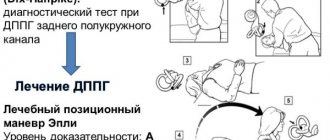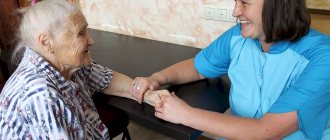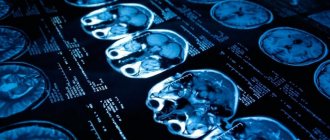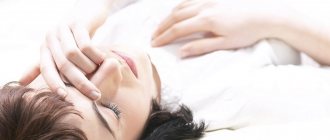Dizziness in the morning
Dizziness after heavy exercise or emotional stress is a normal reaction of the body.
Dizziness in the morning is not a disease in itself. This condition can be caused by pathologies of the cardiovascular system, auditory organs, and neurological diseases.
In any case, before finding out the causes of dizziness, this condition must be alleviated:
- do not rise to your feet abruptly, it is better to lie down for about fifteen minutes
- eliminate oxygen starvation and take deep breaths
- put a cold compress on your forehead
- If you feel chills, you need to cover yourself with a blanket or a warm blanket
- drink a glass of water
A condition where you feel dizzy after sleep can be a harbinger of such serious illnesses as: heart attack; stroke; oncological diseases; atherosclerotic plaques; pathologies of the nervous system, and may be easily removable.
Main provoking factors:
Osteochondrosis of the cervical region
The disease occurs as a result of deformation of the vertebrae and their incorrect location. This leads to the fact that they compress the artery that carries blood to the brain. At night, the sleeper unconsciously takes a position in which the artery suffers even more. Therefore, after sleep in the morning, I feel dizzy and shaky.
Sugar
A sharp decrease in blood sugar occurs due to poor nutrition. Often this condition is experienced by women who are addicted to diets or fasting.
Orthostatic hypotension
The pathological condition occurs when there is a sudden change in body position. This is due to low vascular tone; they do not have time to quickly adapt to changing circumstances. Because of this, blood pressure levels decrease. Therefore, when getting out of bed after sleep in the morning, you feel dizzy.
Malfunctions in the functioning of the vestibular apparatus, in particular the middle ear.
Not hazardous to health. Your head can feel dizzy at any time, including after waking up. It can be easily corrected if you contact a specialist in a timely manner.
Intracranial hypertension
High pressure in the skull puts a very strong strain on the body. In this condition, the headache is severe at any time of the day - at night, in the evening, in the morning after sleep. The pathology is quite dangerous.
Vegetovascular dystonia
The disease is associated with insufficient vascular response to signals supplied by the central or peripheral nervous system. As a result, they have weakened tone. The disease is especially common among teenagers.
Intestinal disorders, poisoning or simply toxicosis during pregnancy
After consuming low-quality or expired food products, toxins accumulate in the body. This happens especially actively at night. After which dizziness occurs in the morning.
Heart diseases
If the heart muscle does not work properly, the activity and tone of blood vessels is significantly reduced. This negatively affects blood flow, it becomes slower and sluggish. As a result, all body cells lack nutritional compounds, as well as the vital element oxygen. This leads to dizziness after sleep, and it is difficult for the patient to get out of bed.
Psychoneurological diseases
Daily psycho-emotional stress does not pass without leaving a trace. Due to nervous shocks, the brain is constantly tense and works hard. This leads to rapid depletion of reserve forces and overwork.
Anemia
Dizziness in the morning with anemia occurs due to low hemoglobin content in the blood and insufficient nutrition of the tissues of the vestibular apparatus. Common symptoms of anemia are mild dizziness, nausea, fainting, unsteadiness of gait.
If severe dizziness in the morning continues regularly, you should consult a doctor and undergo a comprehensive examination.
In conclusion, I would like to say that the correct lifestyle should be made the norm.
Have questions? Write to the doctor.
Types of dizziness
Depending on the cause of dizziness, the following types of condition are distinguished:
- central: associated with brain pathology;
- peripheral: occurs against the background of damage to the vestibular system or vestibular nerve.
Another classification option includes two types of dizziness:
- systemic: provoked by a failure in any of the systems responsible for orientation in space (visual, vestibular, proprioceptive); usually it seems to patients. that objects are spinning around them;
- non-systemic: caused by psychogenic reasons (stress, severe fatigue, hunger, etc.), usually not associated with a feeling of circular motion.
Make an appointment
How to cope with dizziness?
If it is not possible to determine why you feel dizzy in the morning, you should try to alleviate the condition yourself. Since uncontrolled vertigo leads to falls and bruises, the patient needs to be extremely careful when getting out of bed.
The best thing to do when waking up is not to jump out of bed abruptly, turn on your back, look at the ceiling, throw your head back, look up. After this, stretch your arms as high as possible behind your head, slowly turn over to your left side, right side.
You need to get up from a position on your side, not from your back. If your head is still dizzy, even after doing the exercises, when getting up, hold onto the bed or chair with your hand. If dizziness occurs regularly, you should keep a glass of water on your bedside table. By drinking a couple of sips, you can take your mind off the unpleasant sensations and restore your normal state.
Do not take deep breaths; a sudden intake of a large volume of oxygen can lead to increased discomfort. To stop dizziness, it is enough to breathe slowly and calmly.
Elderly people feel dizzy
If we take the elderly, for example, then one of the reasons why dizziness may occur when the position of the body changes abruptly (from a lying state to a sudden rise or from a sitting position) is the so-called orthostatic hypotension. In this case, the pressure drops sharply, a lack of oxygen in the brain occurs, and dizziness appears.
At the same time, the cause of dizziness in such a situation in elderly people can be anemia, heart problems, blood problems - there are many different options.
Treatment of morning headaches
The treatment regimen is selected individually and depends on the clinical picture, the exact diagnosis, the patient’s age and other factors. It will include several stages aimed at eliminating the root cause of morning headaches and relieving symptoms.
- Drug therapy is prescribed for pain of any origin. The regimen may include the use of painkillers and anti-inflammatory drugs, muscle relaxants, and antispasmodics. For hypertension, diuretics and drugs to correct vascular tone are additionally prescribed. Infectious diseases often require the use of antibiotics to kill pathogenic bacteria.
- Massage, physiotherapy, therapeutic exercises are a complex effective for the treatment of diseases of the cervical spine, inflammatory diseases of the nerves and blood vessels. They help improve blood circulation in the neck and head, relieve muscle spasms, and restore nerve conduction.
- Surgical intervention is used only in cases where drug treatment does not bring results. Surgery may be required to treat purulent sinusitis, remove tumors and hematomas in the neck and head.
Most patients who experience frequent morning headaches are treated at home. It is important to take medications on the schedule prescribed by your doctor, as well as follow additional instructions. If necessary, the Clinical Institute of the Brain has the opportunity to undergo treatment in a hospital setting, under 24-hour medical supervision.
Dangerous symptoms
The most dangerous morning symptoms along with dizziness, in which you should run to the doctor:
- weakness in muscles to the point that a person is unable to make movements;
- dizziness accompanied by pain;
- fever, vomiting;
- numbness of the limbs, loss of sensitivity.
Several doctors should examine these symptoms at once: an ophthalmologist, a neurologist, an endocrinologist. X-rays of the skull, spine, ultrasound, tomography, etc. are performed. all these tests will be able to shed light on the patient’s condition and determine why problems arose and how to eliminate them.
Examination methods
Diagnosis of headaches is carried out using complex techniques, tests and equipment. A simple examination is not enough to determine the cause of morning discomfort and poor health. The doctor may prescribe a set of examinations, which include:
- blood tests - a way to determine viral and bacterial infections, hormonal disorders, poisoning, vitamin imbalance and other diseases;
- Ultrasound, cardiography – techniques for examining the heart to identify defects, heart rhythm and conduction disturbances, congenital and acquired structural anomalies;
- Dopplerography - ultrasound diagnostics of blood vessels using a contrast agent, prescribed if insufficient blood supply to the brain is suspected;
- MRI of the head and neck is an informative diagnostic method for identifying neoplasms, acute and chronic diseases, and examining the cervical spine.
The Clinical Brain Institute has all the conditions for a complete examination for headaches. Modern equipment, doctors with many years of experience, the ability to obtain accurate results are our main advantages.
Lack of sleep and its causes
Lack of time tops the list of reasons. Of course, modern man is in a hurry and does not have time to do anything. As a result, even in the evening he cannot relax, trying to:
- do the work taken home;
- watch movies;
- scroll through social networks and more.
As a result, the correct rhythm gets lost and a person begins to fall asleep only late at night - at 2-3 o’clock. The negative consequences of such a schedule will not be long in coming.
Somnologists note that another cause of insomnia is an incorrect approach to organizing sleep. To fall asleep quickly and deeply, you need to:
- 2-3 hours before, turn off the TV, put aside smartphones;
- ventilate the room;
- first turn off the bright lights, leaving 1 night light or source of diffused light;
- lower the blackout curtains.
Doctors also recommend removing any flashing light sources from the bedroom.
Of course, the factors listed are not the only ones on the list of reasons that have a negative impact on falling asleep. This also includes:
- stress;
- anxiety syndrome;
- nervous disorders;
- pregnancy;
- depression.
As a result, lack of sleep becomes chronic.
Some useful tips
- In the morning, before getting out of bed, sit for a while. Get up slowly, slowly, without making sudden movements.
- Drink a cup of cold water while sitting in bed before you get up.
- Refrain from strong coffee, quit smoking, and do not abuse alcohol.
- Many healers and doctors advise anyone who feels lightheaded or dizzy in the morning to take a morning shower, harden with a contrast shower, and take air baths. Go out into nature more often, breathe fresh air, take walks in the fresh air. It is useful to visit the sauna and take a steam bath for your health.
Norms and benefits of sleep
Adequate sleep is a relative concept. Traditionally it is believed that the normal duration of night rest is 8-9 hours. But there are people who feel great with 4-5 hours of sleep a day and even with a three-hour rest. Therefore, you need to focus only on your feelings and the needs of the body. If you want to sleep at least 12 hours, it means:
- This is the rhythm that suits a particular person;
- You shouldn’t fit yourself into the generally accepted framework.
Somnologists deal with issues of periodic lack of sleep and chronic lack of sleep. They:
- determine the cause of the problem;
- her character;
- developing effective treatment.
First of all, somnologists strongly recommend that you pay attention to sleep disorders. Because during the period of night rest, very important processes occur in the body:
- active production of serotonin, which is responsible for growth and development;
- strengthening the immune system;
- renewal of tissues and cells;
- restoration of mental functions.
Subsequently, it is impossible to artificially compensate for the lack of sleep.


